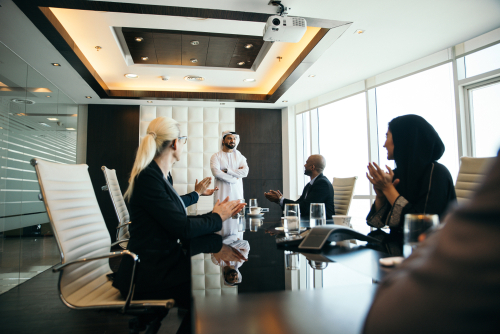The UAE has been named one of the world’s best places to work in the latest HSBC Expat Explorer survey. This puts the UAE ahead of other top destinations including the US, UK, Hong Kong and Australia. So, why all the positivity?
First, the financial benefits can be substantial. High earnings, almost no taxes and opportunities for career progression allow many expats to pay off debts and build up savings to secure their future. But, with seven out of 10 people recommending the country to someone looking for a new life abroad, there’s more to expat life in the UAE than money.
The survey respondents also praised the safety and security of the country alongside a great, cosmopolitan lifestyle with top restaurants and stunning beaches (not to mention the sunny weather to enjoy them). If you’re relocating as a family, you’ll find an excellent choice of international schools and plenty of family-friendly entertainment.
Of course, moving to a new country always requires a cultural shift. Here, at City CV, we work with lots of international clients and several of our team have been expats themselves. The UAE has plenty to offer, but there are numerous differences with Western business culture to be aware of when starting a new role or networking. Check out our tips before packing your passport.
Relish learning about this mosaic of ideas and customs
You’ll be in good company as an expat in the UAE. The expat community comes from all around the world and accounts for almost 90% of the population. That makes for a huge variety of exciting cultures, customs and food.
If you’re moving to the region for work, you’re most likely heading to Abu Dhabi or Dubai. This is where the majority of multi-national companies have their offices and you’ll find many opportunities for expats, particularly in accounting, finance and IT. These cities have a cosmopolitan and secular feel but remember, your professional success always depends on you being sensitive and respectful of the local culture.
This official UAE Government Portal is an essential reference for everything from visas and health care to doing business and complying with the legal system.
Embrace your new office hours while working in the UAE
Working days in Dubai vary from one company to another. The working week is Sunday to Thursday, and the weekend is Friday and Saturday, although many companies are open six days a week, only closing on Fridays. Working hours can also vary, with some companies operating a straight eight-hour day while others adopt a ‘split’ shift with a three or four hour break in the middle of the day.
During the holy month of Ramadan, it’s appropriate for everyone (including non-Muslims) to participate in the fast and abstain from food and drink during the daytime. At the very least, you should be sensitive to your host country and, if you do eat at work, find a private area of the office.
On the plus side, you get to join in the celebrations as families come together to break their fast at the incredible night markets. As well as a wide array of delicious cuisines, the markets are also a hub of cultural and entertainment activities.
Some tips for networking and attending business meetings
The business culture is generally more formal and socially conservative than you may be used to in Europe or the US. UAE citizens are renowned for being polite and place great importance on building strong business relationships and personal connections. This is not something that can be rushed so welcome questions about family welfare and general socialising in meetings and at networking events before getting down to business.
Exchanging business cards (with the right hand) is still widely expected in an initial meeting. It’s also considered respectful to have one side of your card in English, the other in Arabic. Don’t be surprised to find colleagues and clients addressing each other as Sayed (Mr) or Sayeda (Mrs).
A light, gentle handshake between men is the appropriate approach. Firm handshakes can be seen as rude and overly domineering. The handshake greeting is often followed by placing your right hand on your heart or chest as a token of respect. Here’s a quick etiquette guide if you’re unsure.
Sharing lunch or other meals with business contacts is often considered part of the relationship building process. It is respectful to avoid consuming alcohol, pork or shellfish with your hosts.
If you’re used to a casual dress work environment be aware that, in the UAE, both men and women are seen as more professional if they wear smart suits and closed toe shoes. Generally, trousers or knee-length skirts are fine for women, but it’s a good idea to check with the company you are working in about their particular dress code. Non-Muslim women don’t need to wear a hijab, unless they are visiting a religious site.

Digital Etiquette
Emiratis love social media. According to the latest statistics, 99% of the population are active social media users, spending on average about three hours a day on social platforms, particularly Facebook and Snapchat. LinkedIn is also growing rapidly.
In fact, UAE members rank as the most connected LinkedIn users in the world, with an average of 211 connections per individual. Professionals in the UAE rightly see LinkedIn profiles as much more than just online CVs; they are a crucial online personal branding statement in a highly competitive business environment.
Anyone using social media in the UAE should be aware of certain laws governing privacy, sharing pictures and posting content that is offensive to Islamic morals and values. It’s worth checking out the guidelines here.
Learning another country’s business etiquette doesn’t mean you have to master every nuance. But, there are numerous cultural differences in the UAE with the potential to cause embarrassment or even jeopardise your new role. What passes for good manners or acceptable behaviour in Western cultures may be insulting or insensitive in another. Be straightforward, open and attentive – watch and listen carefully and don’t be afraid to apologise if you think you have made a mistake or caused offence.
Finally, if you’re going to make the UAE your professional home for any length of time, it’s definitely worth checking out this ‘10 things you can’t do in Dubai’ article first. Like any international relocation, the UAE offers both excitement and challenges. But, if you make the effort to embrace the culture and respect the rules, it could be your dream move.
Next Steps
City CV offers a comprehensive range of careers services at every level, from graduates to management and CEO-level executives seeking roles in the UAE. This includes targeted professional CV, executive CV, covering letter and LinkedIn profile writing, as well as interview and career coaching. If you have any other questions, please call us on 020 7100 6656 or email us at enquiries@citycv.com.

